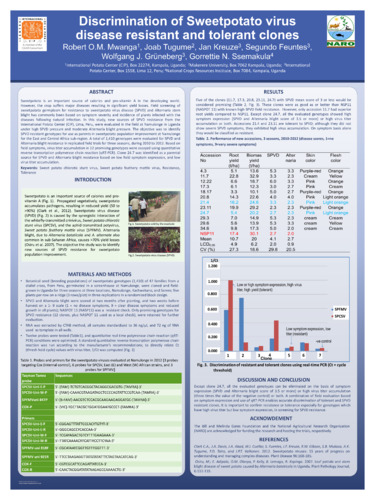Sweetpotato is an important source of calories and pro-vitamin A in the developing world. However, the crop suffers major diseases resulting in significant yield losses. Field screening of sweetpotato germplasm for resistance to sweetpotato virus disease (SPVD) and Alternaria stem blight has commonly been based on symptom severity and incidence of plants infected with the diseases following natural infection. In this study, new sources of SPVD resistance from the International Potato Center (CIP), Lima, Peru, were evaluated in the field at Namulonge in Uganda under high SPVD pressure and moderate Alternaria blight pressure. The objective was to identify SPVD resistant genotypes for use as parents in sweetpotato population improvement at Namulonge for the East and Central Africa sub-region. A total of 1,410 genotypes were evaluated for SPVD and Alternaria blight resistance in replicated field trials for three seasons, during 2010 to 2012. Based on field symptoms, virus titer accumulation in 12 promising genotypes were assayed using quantitative reverse transcription polymerase chain reaction (qRT-PCR). Clone 24.7 was identified as a parental source for SPVD and Alternaria blight resistance based on low field symptom expression, and low virus titer accumulation.
Discrimination of sweetpotato virus disease resistant and tolerant clones
Citation: Mwanga, R.O.M. 2015. Discrimination of sweetpotato virus disease resistant and tolerant clones. Final abstracts guide. 23. International Plant & Animal Genome Conference. San Diego, California (USA). 10-14 Jan 2015. California (USA). PAG. No. P1204.
2015-04-01
poster

